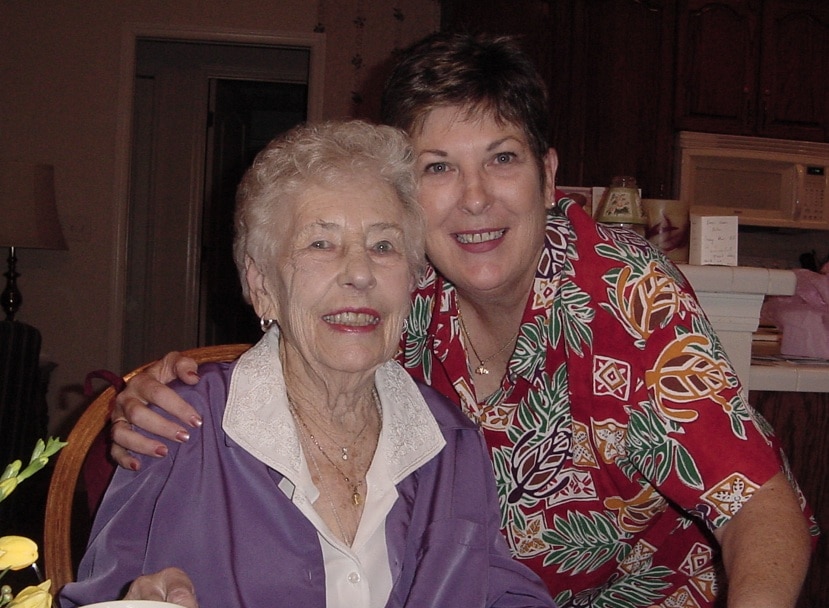by Mary Russo
My mother lived with my husband Dan and me for eight years before she left this world. It was a privilege to have her with us and I could write a book about the wonderful experience. But I also remember the challenges, especially the medical problems that required me to step in and become her advocate.
She was 89 and all seemed just fine, until she had a mild heart attack. During her recovery, her lungs repeatedly filled with fluid. Mom’s regular doctor was not on duty when we visited his practice.
The doctor who examined my mother said, “It’s the result of old age.” She prescribed a very common diuretic, often referred to as a “water pill,” along with another heart medication. But about two weeks after my mother began the medication, red, itchy, swollen hives seem to take over her body.
Full disclosure here, I’m an RN and I generally pay attention to details about medication. I knew my mother was allergic to sulfa. But these were not sulfa drugs, right? I did research and was stumped.
My mom was itching and uncomfortable for two weeks and I took her to visit the doctor again. Her regular doctor didn’t think the medication was causing the reaction. And my mother didn’t want me to do anything that upset him.
Like a lot of other people in her generation she never questioned a doctor’s advice.
But I couldn’t let her suffer. I called a colleague who is a Doctor of Pharmacy. Sure enough, he said there was sulfonamide in the diuretic. I went back to my mother’s doctor with this information, and he said, “It was not likely the cause of her reaction.”
I politely but assertively suggested we try an older version of the diuretic that didn’t contain sulfa. This was the medication recommended by my friend.
I suggested that the doctor prescribe it just to be safe. It didn’t surprise me when the doctor resisted. After all, I was just a daughter and a nurse. I wouldn’t take no for an answer and the doctor agreed reluctantly.
This was the first time I bucked the medical profession and advocated for my mother but it wasn’t the last. The fluid in her lungs persisted, and I kept asking questions. And then my mom developed a gastrointestinal problem and appeared to be dehydrated.
I called the doctor’s office to ask if she should stop the medication and a nurse told me the doctor wanted her to continue. She seemed irritated and asked, “Don’t you think the doctor is the best judge of what you should do?” I said, “No,” and asked for appointment to see the doctor. We received an appointment for the next day.
But that night, we had to rush mom to the emergency room. Her physician really paid attention this time. He ordered a transesophageal echocardiogram and found the problem was a heart valve that would not close properly because the cords that held it in place had ruptured.
Mom didn’t have other health issues, so when the doctor suggested surgery it seemed like a good option. The other one was unthinkable. If she didn’t have the surgery, there was the possibility at some point she’d drown in her own pulmonary fluids. Because of my training and work in intensive care and cardiology, I was able to discuss the serious risks with her. She went into this with eyes wide open.
But still we were unprepared for the nightmarish incidents that occurred in the hospital prior to surgery because of inadequate medical or nursing interventions at critical moments.
Everyone needs an advocate
I won’t go into every detail, but I’m writing this because I think every older person who goes into the hospital needs someone to watch out for them and advocate with the medical staff.
Here’s what happened
Mom was awaiting surgery. A nurse was supposed to prepare her with a shower the night before. But that never happened, so I helped her into the shower and heard her struggling for breath and gurgling. I found the nurse on duty and suggested my mother needed intravenous diuretics immediately because she was about to crash. T
he hospital couldn’t reach my mother’s doctor, I suggested they better get an order from another doctor in the ER. I was told they were changing shifts.
My mother was sweaty, clammy and losing consciousness. I was at my wit’s end and got very vocal. The respiratory therapist told me I was upsetting other people. You can imagine my response.
Finally, a doctor ordered the IV diuretic. This was the same drug we suspected she was allergic to but there was no alternative. Nurses from ICU were called in, her doctor arrived and remained at her side until she stabilized. But the surgery was cancelled.
Within a couple of days she was able to leave ICU. She then had a cardiac catheterization to find out if her heart was strong enough for surgery after everything that happened.
Still more
And again, I found that paying attention and vigilance was really important. After this procedure, her blood pressure dropped. I mentioned this to the tech and he told me she was doing fine and was being returned to her room.
I left to pick up sandwiches in the cafeteria and my husband Dan stayed with Mom. In her room, Dan saw that her color seemed off and she was losing consciousness.
He immediately called for help. Her blood pressure dropped dangerously low because of bleeding in the femoral artery used for the catheterization. For the next few hours she peacefully drifted in and out.
At one point she turned to us and said very calmly, “If this is my time, it is a good way to go.” I really thought this was it. Miraculously, a few hours later, she turned the corner and started to improve.
Because she felt better, she still wanted the surgery that would stop the fluid from flooding her lungs. The surgeon agreed to perform a mitral valve replacement and double coronary bypass.
Mom spent two weeks in ICU. It was not a speedy recovery but each day she showed a little improvement. The staff and doctors were wonderful.
A potentially dangerous pill
She spent the next week on a regular floor, and one of us was with her at all times. It was a good thing. She was prescribed a heart pill that only came in a150 mg. dose. The nurse needed to break the pill in half for my mother’s dosage. But I had to intervene on three separate occasions to because a nurse was about to give her the whole pill.
Recovery
There were little blips along the way, but mom went into rehab and finally came home to us. She recovered beautifully.
Wonderful years
Yet, I truly believe if we hadn’t paid close attention to the medical care, during this journey, she would have died. We would have missed the next six wonderful years with her. And they were great.
She enjoyed her family and friends, attended weddings of her grandchildren and met new great-grandchildren. The day before she passed on she played cards with her brother, had her hair done, polished her nails and did her exercises in the pool.
Her quality of life was really quite good at 95 years of age. We were all very lucky, but some of that luck we made ourselves by acting as her advocate.
Tell us your story. We’d like to post it here on ConsumerMojo.com. View our video Key Steps for Retirement Planning and When to Choose Assisted Living for important tips. Like us on Facebook and Follow us on Twitter.



